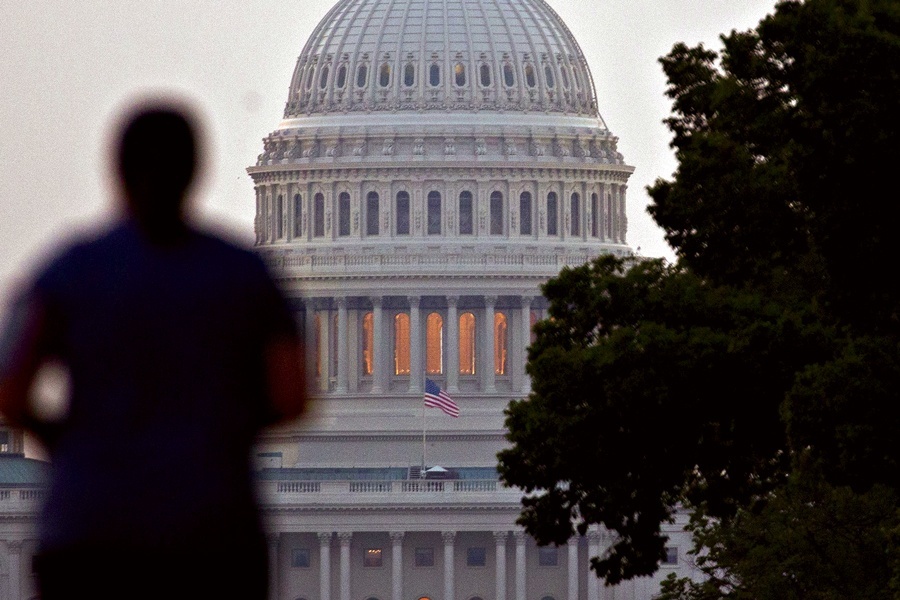

Dozens of members of the Investment Adviser Association went to Capitol Hill Thursday to urge lawmakers to stop legislation that would require advisers to establisd anti-money laundering programs and to encourage legislators to approve a major retirement savings bill.
As part of IAA’s Adviser Advocacy Day, about 65 investment advisers met with members of the House and Senate as well as their aides. At the top of the agenda for most of those talks was the AML provision of the National Defense Authorization Act, which is now before the Senate after overwhelming bipartisan approval in the House earlier this year.
The AML rider — the Establishing New Authorities for Business Laundering and Enabling Risks to Security Act — would expand the definition of a financial institution to include investment advisers. It would require advisers to establish anti-money laundering and due diligence programs, report suspicious transactions, and identify and verify account holders.
The measure was tucked into the bowels of the NDAA by Democrats who are concerned about money being hidden by Russian oligarchs during Russia’s war in Ukraine.
But the AML provision overlaps with a regulation being developed by the Treasury Department’s Financial Crimes Enforcement Network, known as FinCen, Neil Simon, IAA vice president for government relations, said Wednesday at the IAA Policy and Leadership Forum.
“The duplication is unwarranted,” Simon said. “We’re trying to convince Congress: Let FinCen do the job, drop the AML provision” from the NDAA.
The NDAA is one of the few must-pass bills going through Congress this fall. It is a measure lawmakers pass annually because it affects Pentagon funding. It usually garners strong bipartisan support.
Any nondefense riders in the bill, such as the AML provision, must also have bipartisan support from committees that have jurisdiction over the issue, Langston Emerson, a partner at Mindset, a government relations consulting firm, said at the IAA conference.
But the highest-ranking Republicans on the Senate Banking and House Financial Services committees, Sen. Patrick Toomey of Pennsylvania and Rep. Patrick McHenry of North Carolina, oppose the AML rider.
That resistance should be enough to take the provision out of the NDAA.
“There will be some opposition on the floor, which means the likelihood of it being included is slim to none,” Emerson said.
Simon encouraged IAA members who are meeting with Toomey to thank him for his opposition to the AML legislation.
“That’s what Adviser Advocacy Day is all about,” Simon said.
IAA members who discuss retirement savings legislation working its way through Congress are likely to hear bipartisan support. They are encouraging lawmakers to pass a measure known as SECURE 2.0, a follow-on bill to the landmark SECURE Act that Congress approved in 2019.
The legislation would raise the required minimum distribution age from 72 to 75, increase catch-up limits in retirement plans and make it easier for small employers to offer plans, among many other provisions.
The House approved the bill overwhelmingly earlier this year. Two Senate committees have passed companion legislation. If each chamber doesn’t approval an identical bill by the end of the year, it must be reintroduced in the new Congress that begins in January.
“We are strongly supporting the Senate acting on this bill — if not in the waning days before the [midterm] election, [then] in the lame-duck session that will occur after the election,” Simon said. “We need your help on that.”
IAA CEO Karen Barr was pleased with the turnout for the organization’s congressional outreach despite lingering concerns about the coronavirus pandemic.
“We have a good group going up to the Hill,” she said.

Chasing productivity is one thing, but when you're cutting corners, missing details, and making mistakes, it's time to take a step back.

It is not clear how many employees will be affected, but none of the private partnership’s 20,000 financial advisors will see their jobs at risk.

The historic summer sitting saw a roughly two-thirds pass rate, with most CFP hopefuls falling in the under-40 age group.

"The greed and deception of this Ponzi scheme has resulted in the same way they have throughout history," said Daniel Brubaker, U.S. Postal Inspection Service inspector in charge.

Elsewhere, an advisor formerly with a Commonwealth affiliate firm is launching her own independent practice with an Osaic OSJ.
Stan Gregor, Chairman & CEO of Summit Financial Holdings, explores how RIAs can meet growing demand for family office-style services among mass affluent clients through tax-first planning, technology, and collaboration—positioning firms for long-term success
Chris Vizzi, Co-Founder & Partner of South Coast Investment Advisors, LLC, shares how 2025 estate tax changes—$13.99M per person—offer more than tax savings. Learn how to pass on purpose, values, and vision to unite generations and give wealth lasting meaning
